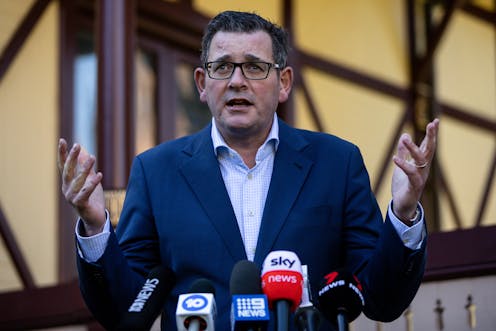
We talk a lot about chasing down corrupt behaviour and holding wrongdoers to account. As we should. This is what the debate about a national integrity commission has been all about.
But let’s also think about another aspect of this issue – the need for politicians to have better values and respect for standards in the first place. Partly, this involves clear deterrence. But it also goes to the more challenging issues of political culture and recruitment.
Anyone reading Wednesday’s news from Victoria and NSW would have no trouble understanding the distrust and disgust many ordinary people feel towards the political class.
In Victoria an Independent Broad-based Anti-corruption Commission and Ombudsman joint inquiry was scathing about the behaviour within the faction-ridden ALP.
One sentence went to the heart of things: “Operation Watts found a political culture, condoned or even actively encouraged by senior figures, of ends justifying means and of bending and breaking rules”.
Premier Dan Andrews said he took responsibility and he apologised. “The key point is to drive both cultural and practical change and the best way to do that is to deliver on each and every one of the recommendations,” the premier said.
Yes, all good. But those with a passing acquaintance with the history of the Victorian ALP will know that “ends justifying means” has been the religion of its players for many decades. Will things permanently change?
Then there’s the Barilaro scandal in NSW, where the former deputy premier and trade minister obtained for himself a $500,000 trade commissioner job in New York (from which, amid a furore, he was forced to step back before starting).
In a written statement to a parliamentary inquiry, Mark Connell, a former chief of staff to Barilaro, has alleged that in 2019, Barilaro had told him “I’ve just come from a meeting with [Treasurer] Dom [Perrottet] and [minister] Stuart [Ayres] regarding trade and we’re going to bring back the Agent General in London as well as a bunch of other postings around the world'’.
According to Connell, Barilaro stated, ‘This is it; this is the job for when I get the f— out of this place”.
Barilaro then allegedly said: “I don’t want to go to London, f— that, I’m off to New York […] I’ll get them to put one in New York.”
Barilaro says the account is “fictitious”.
There have been many claims and counter claims as the tortuous course of the Barilaro affair has been probed. Regardless of the precise details, it is clear Barilaro’s pursuit of a job reflected an absence of a sense of propriety or integrity.
With the proper belts and braces, better standards can be applied. Tangible reforms can be made.
But even when structures and strictures are imposed, the problems aren’t necessarily solved.
Obvious as it might sound, we need people who are more strongly grounded in personal integrity and ethical behaviour coming into politics.
One brake on this is that many who would fill that bill have no desire to enter this often unsavoury world. And who can blame them?
Moreover, even when they’re willing, it is frequently hard for the best people to make it through a system where the major parties have been hollowed out, advancement is enmeshed in factionalism, and the preferred path to parliament is often being trained as a political hunter-killer in an MP’s office.
The Victorian report is notable for its observations on so-called “grey corruption”.
It says its investigation “did not uncover examples of what might be termed traditional or ‘black’ corruption” such as, for example, taking a payment from a third party.
Rather, the “Operation Watts investigation was firmly within the zone of ‘grey’ corruption in which decisions are made and rules are bent or broken for the benefit of a decision maker’s friends, political organisation or networks”.
Grey corruption “is characterised by questionable behaviour and decision making that benefits a person’s associates or networks without amounting to criminal conduct.
"However, its effect on public confidence in democracy and its institutions is deeply damaging.”
“A recurring theme in grey corruption investigations is the question of how to design and implement processes that hold public officeholders to account for actions that might fall short of the criminal threshold but nevertheless breach the ethical standards that the community expects them to uphold.”
A Grattan Institute paper, New politics: A better process for public appointments, released this week, documents another front of “grey corruption”.
It argues Australia’s growing “jobs for mates” culture is “undermining our democracy”.
“Many federal and state government boards, tribunals, and agencies are stacked with people who have worked in politics – almost always for the party that was in government when they got the job,” it says.
The checks on grey corruption must be formal standards and processes. Better whistleblower provisions would also be useful.
But equally important is generating an ethos of internalised personal integrity. The large vote for the teal candidates, who had integrity as one of their pitches, shows the issue resonates with voters.
But addressing it requires broader action than the forthcoming integrity commission. It needs a new mindset in the political class. Perhaps don’t hold your breath.
Michelle Grattan does not work for, consult, own shares in or receive funding from any company or organisation that would benefit from this article, and has disclosed no relevant affiliations beyond their academic appointment.
This article was originally published on The Conversation. Read the original article.







